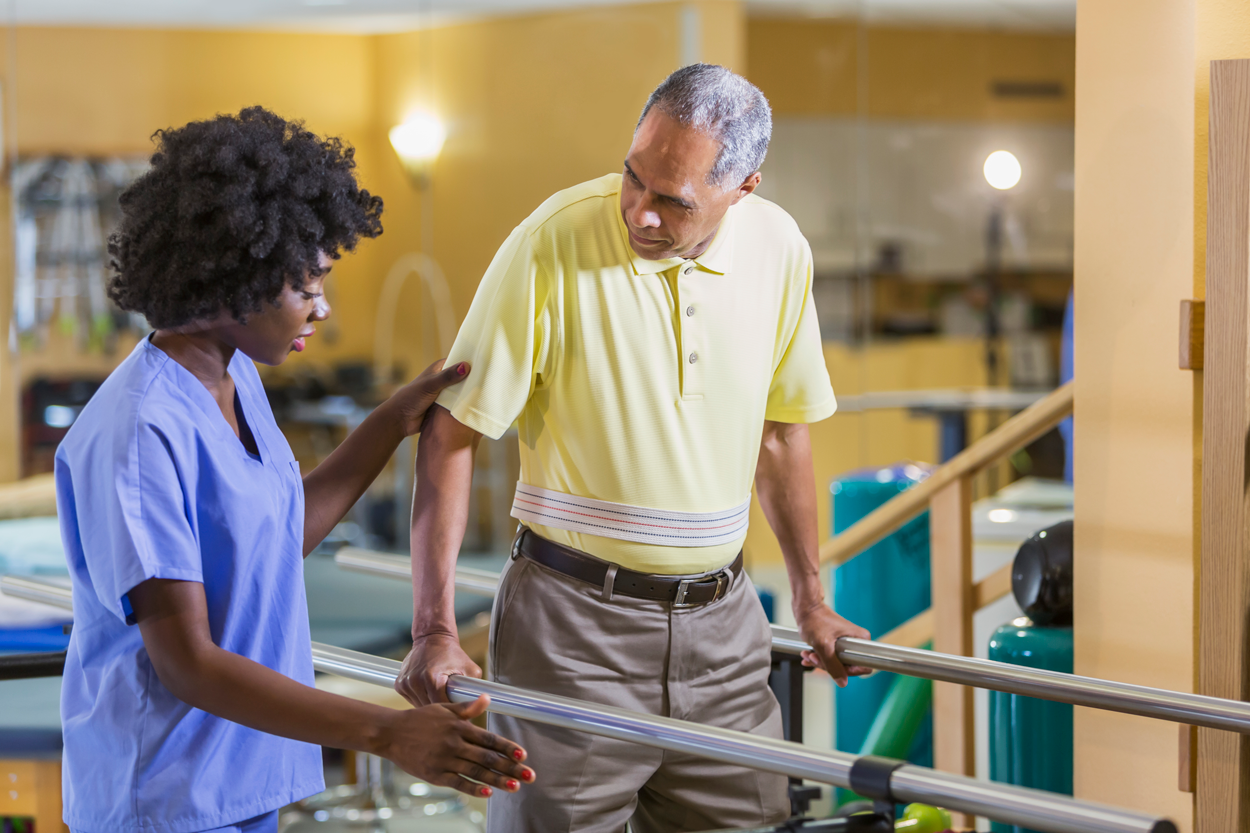Our Programs
Our focused programs cater each individual client’s needs with the goal of improving their quality of life with things we all strive for – security, identity and community involvement, as well as meaningful vocational activities, recreation pursuits and social support. We offer unparalleled support and security needed to ensure that each client has the opportunity to succeed.
For information regarding our programs please click on the links below:

Intensive Rehabilitation
The Intensive Rehabilitation Program is designed to provide aggressive physical, occupational and speech language therapy as well as neuropsychology, behavior therapy, vocational rehabilitation and medical management.
The overall goal of the program is to restore the physical, cognitive and emotional function that becomes disrupted after an injury to the brain. As the client’s ability to function independently improves, he/she will be better prepared to re-enter the community and access community services.
Upon admission, the clinical team will conduct an intensive evaluation to identify each client’s strengths and the barriers to independent functioning. Following the evaluation of approximately 30 days, an individual treatment plan is developed that will include strategies to overcome and/or compensate for barriers to community living and vocational success. These rehabilitation services are provided daily in a structured learning environment that emphasizes those skills to be learned rather than the client’s impairment.
The individual rehabilitation plan is designed to teach, develop or improve each client’s:
- Awareness of abilities and barriers
- Self-care and basic daily living skills
- Strategies to increase emotional control and appropriate social behaviors and to decrease maladaptive behaviors
- Cognitive skills/compensatory strategies
- Physical capabilities for daily living and work
- Functional communication skills
- Work/academic skills and behaviors
- Self-management of medical requirements
- Interpersonal/interactive skills
- Strategies to decrease/control impulsivity
- Productive use of leisure time
- Community mobility and safety
Based upon the client’s needs as identified in the intensive evaluation, the individualized treatment plan may include interventions in the following domains:
Self-care and Basic Daily Living Skills
Dressing, personal hygiene, household maintenance, eating, laundry, banking, community survival skills i.e., resources, goods and services, social and recreational opportunities.
Social Skills
Following directions, accepting feedback/criticism, accepting “no” for an answer, conversational skills, interpreting social cues, respecting others’ personal space, greetings, basic telephone skills.
Cognitive Skills
Direct remediation and/or use of compensatory devices to enhance arousal, memory, attention/concentration, problem solving, planning, and social judgment.
Functional Communication Skills
Pace, intonation and volume of speech, word retrieval, language- expressive and receptive.
Physical Function
Improve balance, coordinate movement, ambulation, and work tolerance/endurance.
Adaptive Work Behaviors
In work adjustment settings, skills such as following instructions, accepting supervisory criticism or compliments, working with a team, punctuality, tool usage, appropriate use of breaks, and use of functional adaptations to increase work capacity.
Leisure Skills
Skills in productive use of free time and utilization of community resources.
Health
Accepting medical procedures, self-medication, health education.
Neurobehavioral Programming
Change in behavior and personality are often the most devastating and limiting consequences of brain injury. These issues can range from subtle, less obvious problems, to extreme disinhibited and inappropriate behavior. Unfortunately, these actions often set up a “revolving door” pattern that potentially leads the client to rapid discharge to begin the process all over again.
These Neurobehavioral Problems include:
- Verbal Aggression
- Physical Aggression
- Self-injurious Behavior
- Substance Abuse
- Medication Compliance
- Poor Judgement and Safety Awareness
- Reduced Ability to Initiate Purposeful Behavior
- Inappropriate Social Behavior
- Noncompliance
- Egocentricity
- Depression
- Sexual Inappropriateness
- Property Destruction
- Elopement Risk
- Verbal Aggression
- Physical Aggression
- Self-injurious Behavior
- Substance Abuse
- Medication Compliance
- Poor Judgement and Safety Awareness
- Reduced Ability to Initiate Purposeful Behavior
- Inappropriate Social Behavior
- Noncompliance
- Egocentricity
- Depression
- Sexual Inappropriateness
- Property Destruction
- Elopement Risk
Oppidan provides neurobehavioral programming based on the knowledge that teaching is a more effective way to change behavior rather than punishment or restriction. This program is staff secured therefore providing clients with supervision to maintain program structure and safety. We do not use locked units, chemical restraints, or mechanical restraints.
Oppidan implements Behavior Development Programs to stabilize clients with a complex neurobehavioral presentation to increase self-monitoring and self-control instead of simply encouraging good behavior to avoid negative consequences.
Our individualized neurobehavioral program includes the following:
- Assessing Risk Levels
- Identifying Target Behavioral for Reduction
- Taking in Special Considerations such as medical concerns, level of supervision, and other considerations included within the client’s physical and speech therapy; if relevant
- Identifying Positive Reinforcers
- Supplying trained staff with appropriate behaviors to reinforce and procedures for how to prevent problematic behavior
- Providing clear goals and objectives for the client through a Behavior Contract
- Frequent monitoring and evaluations
Community Integration
During the past decade we have seen a dramatic increase in the post-hospital/post-acute rehabilitation services for survivors of traumatic brain injury and other neurological disorders. These programs were developed to address the physical, cognitive, social and emotional impairments of brain-injured persons that were not addressed during acute rehabilitation. However, historically the rehabilitation has been conducted in institutional or outpatient clinic environments rather than in the community setting where the brain-injured person will live and work. A major obstacle to successful community integration with current models of rehabilitation is the transfer or generalization of skills learned “in therapy” to real world environments.
Our unique approach to brain injury rehabilitation is designed to provide post-acute rehabilitation and long-term support in the community. This community alternative utilizes “real world” settings to teach and apply the skills needed to live and work successfully in the community. This program is a community oriented, clinically effective, community relevant and cost effective alternative to traditional brain injury rehabilitation.
The goal of this program is to provide active rehabilitation and long-term support/assistance to persons with brain injuries in their home/apartment, workplace and the community. Specific program objectives used to increase these functional skills, maximize performance, and adjust to life after sustaining a brain injury targets the following:
- Personal self-care skills
- Meal planning and preparation
- Community involvement/mobility
- Work and work-related skills
- Social and interpersonal skills
- Personal budgeting and money management
- Personal health and fitness management
- Leisure time use
- Household / appointment management

Supported Independent Living
The Supported Independent Living (SIL) Program of OPPIDAN is dedicated to enriching the quality of life for persons with brain injuries, by providing normalized community living opportunities combined with meaningful, productive and therapeutic daily activities at a reasonable daily cost.
The Supported Independent Living Program provides the client with:
- Supported Independent Living in a dignified community setting
- On-site Case Managers, Supervisors, and Nursing Staff
- Meaningful vocational and recreational skill development
- Individualized programs designed for the client’s specific needs
- Staff secured Neurobehavioral Program
- Supervision 24 hours a day
- Opportunities to access ample resources available in the Central Florida area
The Supported Independent Living Program provides the funder with:
- An individually negotiated comprehensive per diem rate based on the client’s needs.
- A proactive attempt to increase the client’s independence and quality of life therefore allowing us to reduce the daily rate.
- A variety of medical, rehabilitation, educational, and vocational options available on-site and in the Central Florida area.
- Internal Program Case Manager dedicated to insuring quality of service as well as cost-effectiveness.
- Recognized experts in brain injury rehabilitation managing day-to-day operations .
- Program activities and outcomes that are data based and reviewed on a monthly basis.
- Active involvement of the client, family, and funder in decision making.
- Utilization Review conducted weekly to evaluate levels of service and supervision as well as the cost of care.
The SIL program provides the support, supervision and guidance to ensure that each client has the opportunity to experience the quality of life to which we all aspire – security, identity and community involvement, as well as meaningful vocational activities, recreation pursuits and social support.
Vocational Rehabilitation
In American society access to work is an integral part of community living. Work helps us to maintain financial stability, provides us with a major social outlet and helps to shape our unique personalities. Persons with traumatic brain injuries (TBI) and other significant neurological impairments are faced with many barriers to re-entering the workforce and specialized services must be provided to assist these individuals to access the work world.
Combining the clinical practice of neuropsychology, cognitive therapy, behavior therapy, speech therapy, occupational therapy, and physical therapy with vocational evaluation, job seeking skills training, adaptive work behavior training, job development, job placement and supportive employment provides our clients with the best opportunity to achieve their desired vocational outcomes. Oppidan provides a unique opportunity for individuals with brain injuries to learn about themselves and to develop the skills necessary to maximize their vocational potential.
The components of this program consist of:
- Vocational Evaluation
- Pre-Vocational Training
- Job Placement in Occupational Work Trials
- Job Coach Services
- Adaptive Work Behavior Training
- Job Development/Exploration
- Jon Seeking Skills Training
- Job Analysis
- Working Community

Additionally, Oppidan will provide, where needed, professional assistance for individuals in their community of origin where they return and become employed.
Role of Case Management
Comprehensive and coordinated case management is a critical component of any supported living program. Each client is assigned a Program Case Manager that will develop and supervise the implementation of the resident’s individualized treatment plan.
The Case Manager insures that the plan incorporates community resources, specialized services, vocational endeavors, and recreational activities. The case manager is the primary advocate for the resident and revises the treatment plan as service needs change over time.
Our Case Managers provide the family, funder, and/or all other concerned parties with superlative communication through various avenues such as detailed reports, conference calls, meetings, and training.

Family Involvement
We believe that the family is an essential part of the rehabilitation process. We offer family support services including family counseling, support groups, and education programs.
Neurologic Injuries are life changing and impact everyone. Oppidan is committed to providing families with education and training to better understand and cope with the consequences. In addition to family education and training, Oppidan assists in lessening the financial burden placed on family members by absorbing some of the costs associated with travel expenses, meals, and overnight accommodations.
Program Costs
Oppidan offers a comprehensive per diem rate that is negotiated based on individual client needs for support, supervision and daily assistance. The per diem charge is reviewed on a monthly basis and as clients become more independent appropriate adjustments will be made.
The comprehensive per diem rate includes the following services:
- All services as outlined in the Proposed Treatment Plan or as identified by the interdisciplinary treatment team
- Support, supervision and care up to twenty-four hours per day to maintain health, safety and well-being of the client
- Room and Board
- Case management
- Medical and nursing oversight
- Activities of daily living and community mobility evaluations by licensed occupational therapist
- Productive daily activity, based on an individualized treatment plan
- Organized leisure and recreational programs
- Transportation related to program services
Specialized medical, rehabilitation, orthotic, prosthetic and diagnostic services can also be arranged.
Services Not Included in per Diem:
- Services / supplies not related to the brain injury
- Personal care attendant / One-to-one supervision
- Medications
- Laboratory Services / Diagnostic Services
- Transportation not related to program services
- Wheelchair rental / purchase
- Durable medical equipment
- Podiatry services
- Personal care items
